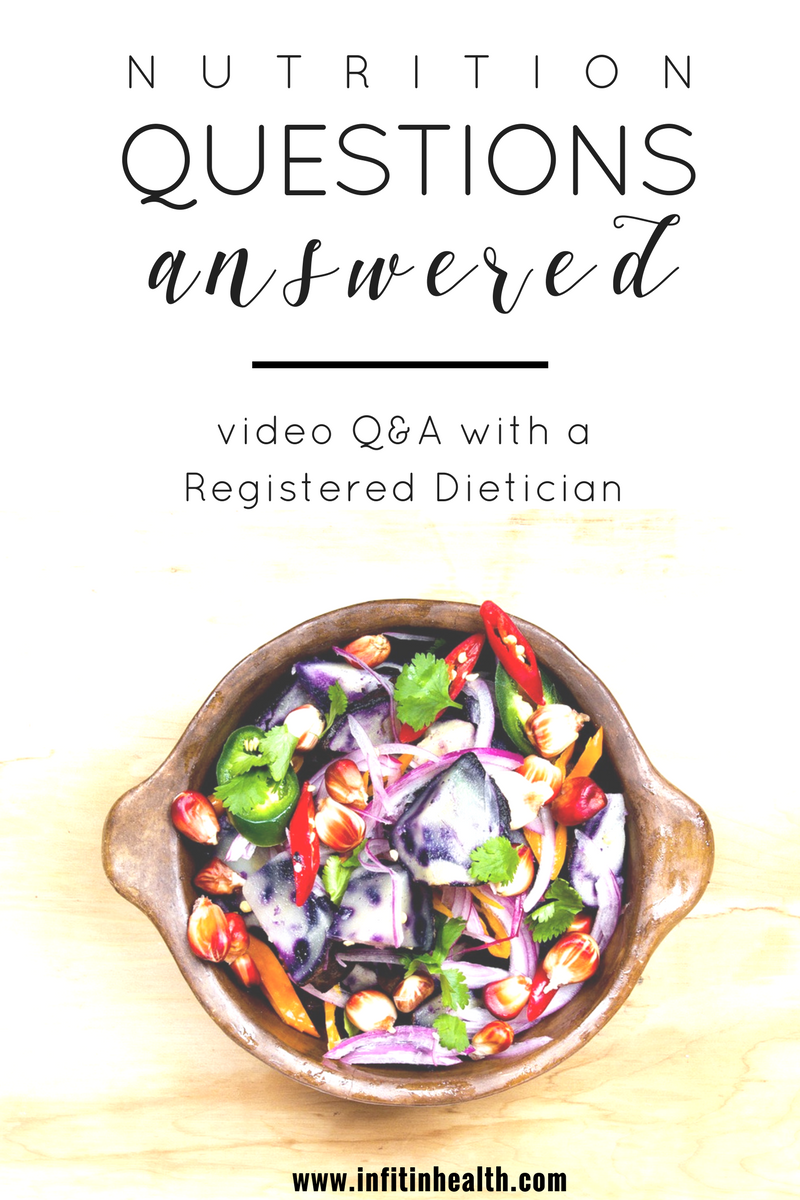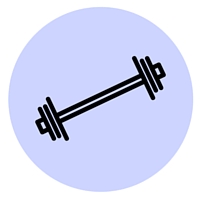Nutrition Questions Answered: Video Q&A with a Registered Dietician (+ a FREE session for readers!)
/Disclosure: this post is sponsored by FitFluential on behalf of American Well. All opinions about the service and questions asked are my own - just like always! Now let's talk nutrition!
Recently I was able to try out a new type of healthcare service called telemedicine provided by American Well. Telemedicine is becoming the newest way to see a doctor for sick visits or chat with a nutritionist when you have questions about your diet. Basically, it's the ability to see a doctor (yes, actually SEE them) via video chat for small things that you don't necessarily have to be physically present for, like a diagnosis of the common cold or just answers to general health questions.
Amwell makes it easy to set up an account and get chatting in no time. All you need to do is enter your name and email address. You then create a password and your account is made. You have the option to choose between a variety of visit types such as medical, diet & nutrition, or psychology (screenshots below). For my visit, I chose diet & nutrition since I had a lot of questions in that area as you'll see in a minute.
Amwell Diet & Nutrition Homescreen
When you're creating your account, you DO have the option to add any medical history, lab results, list of medications, primary care physician contact info, etc. all so they can better assist you. However, none of this is required to schedule a visit. Once you've chosen your area of service, you can choose a provider from the list available. You then select a few general topics that you'd like to discuss, and enter payment info. Note: Amwell does accept most health insurance, so your visit could be partially or totally covered. Otherwise, it's $25 for a 30-minute visit with an RD, and $49 for a medical or psychological visit (also 30 minutes). From there, you enter the payment information (FREE SESSION CODE BELOW!) and you're connected with the specialist in no time.
Option to choose a provider
During my session, I got to speak with Maika Luongo, one of Amwell's Registered Dieticians. She was very nice and quite knowledgeable, and made me feel instantly comfortable asking any questions I had. At the end we also chatted a little bit about the fitness industry and certifications, which was fun and a nice way to round out the convo. But, time for the real information... here's what I asked her.
MY NUTRITION & DIETARY Q&A
1 | Juice cleanses & detox diets: can you really "detox" the body and are these so-called diets actually healthy?
The short answer is no to both. The longer answer is that our kidneys do an amazing job of detoxing the body on their own and flushing out "toxins" from our system. Juice cleanses and "detox" diets don't flush anything out, but rather are looked at as a "quick fix" for weight loss. Now, if you're looking to go on a juice cleanse for a day or two as a way to kickstart your healthy eating habits, that's alright. But these "diets" aren't sustainable long term, and actually lack a lot of nutritional value (think overall calories and protein). Bottom line: when it comes to long term weight loss success, there's no quick fix. Don't give in to the hype.
2 | Is gluten sensitivity real and what differentiates it from Celiac disease?
Call me naive, but I'll be completely honest - I always assumed that unless someone was actually diagnosed with Celiac disease, sensitivity to gluten was all in their head. Well, I was wrong. Gluten sensitivity IS a real thing. It's different from Celiac disease though, and here's why. Celiac disease causes the villi of the small intestine to be destroyed upon digesting gluten, and as a result, the body can't absorb nutrients properly. Because of this poor digestion, people with Celiac disease often have symptoms ranging from abdominal cramps and bloating, to diarrhea, gas, and even constipation.
Similarly, people with a gluten sensitivity experience many of the same symptoms, but their diagnosis does not show intestinal damage. The only way to be diagnosed with Celiac disease is to have a biopsy of the small intestine to show this damage. So, yes, gluten sensitivity IS real, and if you are sensitive to it (or have Celiac disease), opting for a gluten-free diet is in your best interest. But if you're looking for yet another "quick fix" for weight loss, gluten-free isn't the way to go. It won't help you lose weight and it's not going to magically get you that 6-pack. It will, however, make you fit in with the LA it-crowd in a heartbeat.
And, if you don't know what gluten is by now, read this article and educate yourself on what exactly ISN'T in those gluten-free foods you buy at the store. (Read: please don't be these people.)
3 | Can you describe the difference in macronutrient intake for someone looking to lose fat vs. gain muscle?
Depending on your fitness goals (whether you're looking to lose fat or gain muscle), the recommended daily amounts (RDAs) for protein, carbohydrate, and fat can vary. Basically, if you want to gain muscle, you need more protein and less carbs and a moderate amount of healthy fats. The exact breakdown will vary from person to person, but a good metric for daily macronutrient intake is somewhere along the lines of 45-50% carbs, 30% protein, and about 20-25% healthy fat.
For someone looking to lose fat, those RDAs can change. It's said that decreasing the carb and fat intake and increasing the protein will help. The RD I spoke with didn't give me exact numbers here and she really emphasized that these amounts will vary from person to person. So, in that vein, I encourage you to talk with your own doctor or nutritionist before making any changes to your diet.
The bottom line though, if you're looking to gain muscle, protein is your friend. If you're looking to lose fat, protein is also your friend. Decreased carbs are good for both and the fat intake will vary.
4 | What is the recommended daily amount of sugar for the average person? What are your recommendations for someone looking to decrease their added sugar intake?
This was more of a personal question for me, because as of lately I'm finding myself consuming a lot of sugar. It's mostly from healthy sources - flavored greek yogurt, fruit, granola... and yes, I'll admit, the occasional hunk of chocolate or ice cream (yeah, not so healthy, but what's a girl gonna do?). I definitely think I overindulge in sugar, though, and I'm trying to slowly quit the habit. So, I thought I'd find out what the recommended daily amount of sugar is for the average person, and get some guidance on ways to slowly decrease my intake to that amount.
Dr. Luongo told me that the average RDA for sugar is less than 25g per day. (Say what?! I must consume double that at least!) She also told me that equates to less than 5g of sugar per serving (for reference: 1 pomegranate flavored greek yogurt cup has 18g of sugar). So, check those nutrition labels! (You should be doing that already...)
Her recommendations for someone wanting to decrease their added sugar are:
- Stay away from sodas (drink flavored seltzer or water with fresh or frozen fruit)
- Have a snack like plain greek yogurt and/or a piece of fruit to curb sugary cravings
- If you really need an ice cream fix, opt for greek frozen yogurt instead - reason being it has more protein so your satiety level will be reached sooner and you'll stay fuller longer
- Her favorite treats when craving sugary snacks: sliced bananas with honey and cinnamon, greek yogurt, or a piece of fruit.
Luckily I do almost all of those things already, but I do eat a lot of fruit plus a flavored greek yogurt every morning, not to mention the other snacks I have throughout the day plus a few chocolate squares at night. Guess I better start weening myself off to get at or below that 25g per day limit!
FIRST VISIT IS FREE FOR BLOG READERS!
Yep! That's right! YOU all get a 30-minute session with an experienced RD for FREE! And by free, I really mean free. You don't have to enter any credit card information whatsoever. Click the image above to go directly to the sign up form. All you need to enter is your name, email address, and a password. You don't need to provide any other personal information if you don't want to. Upon check out, enter the code FITFORLIFE and you'll be talking to a nutritionist in no time. I hope you guys take advantage of this awesome service - if you've ever thought about talking to a nutritionist about ANYTHING, now is your time to do it!
Readers: chat with me! Have you ever talked with a nutritionist before? Do you think you'd take advantage of this opportunity? What types of questions are on your mind? Did the answers to my questions above help clarify anything for you?







![Strawberry Basil Smoothie + Green Blender Review [Part 1]](https://images.squarespace-cdn.com/content/v1/53b084b0e4b01260143c2d2a/1462322275731-410EB5YH74NYJ4LVA9DC/2016-05-02+17.19.00-2.jpg)






























